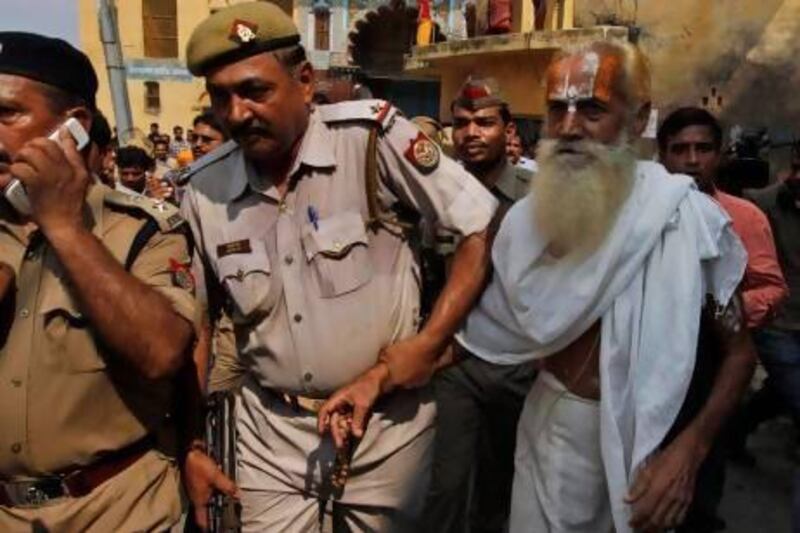NEW DELHI // Hundreds of Hindu nationalists in Uttar Pradesh were arrested yesterday as a right-wing organisation tried to stage a religious procession around the temple town of Ayodhya.
The town has been contentious ever since Hindu right-wing groups tore down a 16th-century mosque in December 1992. The ensuing riots across the country, involving Hindus and Muslims, killed nearly 1,500 people.
Hardline Hindu groups such as the Vishwa Hindu Parishad (VHP) and its political partner, the Bharatiya Janata Party (BJP), want to build a temple at the site of the razed mosque. They believe Ayodhya to be the birthplace of the Hindu deity Rama.
Pravin Togadia, the president of the VHP, was taken into preventive custody yesterday morning. Police did not say when he would be released.
Ayodhya's street*s swarmed with 8,000 khaki-clad policemen and personnel of the Rapid Action Force, which specialises in riot control.
More than 600 people were arrested, police said.
The procession around Ayodhya - a parikrama - is an annual affair, in which up to 300 Hindu holy men take nearly three weeks to walk a circuit of 250 kilometres.
This year, the VHP thrust itself to the forefront of the procession. Even though it has imposed no explicit agenda upon the event, a VHP media official told the Mint newspaper that the gathering would "discuss the present situation" about the proposed temple.
The VHP insists that the parikrama has no political overtones. But its detractors have argued otherwise.
"This is not a religious procession. This is a political procession," Rita Bahuguna Joshi, a Congress party parliamentarian, said yesterday.
Fearing communal violence, the Uttar Pradesh government had banned the procession and taken measures to fortify the town.
More than 350 VHP activists were arrested in the state on Saturday. The banks of the Sarayu river, along with other strategic points in Ayodhya, were manned by police.
Ten schools in the nearby town of Faizabad were kept ready to be used as makeshift jails to hold people who breached the ban.
The Uttar Pradesh government, claiming that thousands of people were expected to participate, defended its decisions. A spokesman for the Samajwadi Party, which runs the state government, said his party "won't allow anything that will raise communal tensions in the state".
The BJP, while refraining from participating in the procession, criticised the ban on it.
"Giving security to any religious event of the people belonging to any faith and caste is the responsibility of the government," Rajnath Singh, the BJP president, said on Thursday.
If the government anticipated a breach of the peace "from 150 saints, it has adequate force", said Mr Singh, referring to Hindu holy men. "It should deploy 200 to 400 security personnel and give permission for the parikrama."
One midlevel BJP official said the event "did not have the backing of the party, very honestly. None of the BJP foot soldiers have been sent to Ayodhya".
"But it's also true that, in being seen as standing up so aggressively to the VHP, the Samajwadi Party will benefit in the elections next year," he said. "This way, they'll endear themselves to Muslim voters."
Even within the community of Hindu holy men, however, the VHP's co-option of the procession has drawn sharp criticism.
In a letter to the Uttar Pradesh chief minister last week, the Shankaracharya of Puri - one of the heads of Hinduism's foremost monasteries - called the VHP's agenda "a farce".
The procession, he wrote, would give Hinduism a bad name and would "push simple-hearted people into the abyss of darkness."
[ ssubramanian@thenational.ae ]
twitter: For breaking news from the Gulf, the Middle East and around the globe follow The National World. Follow us





